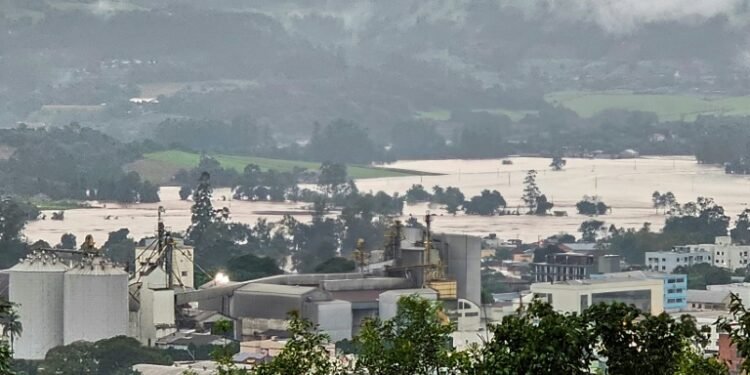ncantado: Brazil’s booming southern economy has been brought down by historic floods, leaving vast tracts of farmland unusable and factories in ruins.
While trying to collect the full cost of their losses, they are asking for help to recover and take action against future extreme climate events.
“As far as we can see, no one was hurt,” said Gedeo Pereira, president of the Farmers’ Federation of Rio Grande do Sul (Farsul).
“There is widespread damage, especially in the central region of the country,” he said at a press conference.
The month-long historic floods, blamed by experts on a strengthening El Niño, have killed 169 people and left nearly 600,000 homeless.
Nine out of 10 factories in the country were affected by the floods, according to the Federation of Local Industries.
A preliminary study published by Farsul estimated that large landowners lost up to 25 million reais ($5 million).
However, while the water is still receding, the true cost of the damage in the area of 11 million people has not been calculated.
“The amount of damage affects us more and more as we continue our journey across the country,” said Pereira.
During the flood, the bridge collapsed and the road was in bad condition, making it very difficult to transport goods.
He told AFP that this would be the first step in getting the company back on track.
Fontana is a partner with the same 90-year-old chemical manufacturing firm in Encantado, on the banks of the Taquari River.
The company, which employs 250 people, could not continue production as a series of large chemical tanks tilted like the Leaning Tower of Pisa from the force of water.
The federal government announced, among other measures, a loan line of 15 billion reais ($2.9 billion) with low interest rates and the possibility of renegotiating existing debts.
However, Pereira told AFP that “a longer repayment period, up to 20 years” is needed.
“It’s good for producers, but we need more credit,” said Carlos Joel da Silva, president of the country’s Federation of Agricultural Workers, which represents more than 700,000 workers on small farms.
Only tilling agricultural land to make it fertile is expensive.
The region has experienced four extreme weather events in the past year, and businesses say it’s time to make emergency plans against a changing climate.
The Fontana company made such a plan after the 2023 flood.
This time, when heavy rains were predicted, “we removed from our equipment and electronic components,” said company director Ricardo Fontana. “So we limit the damage.”
Angelo Fontana said about 10 percent of his company’s employees have asked to quit since the floods, citing the risk of “labor displacement” in the area.
The threat of extreme weather can cause some to give up their jobs.
Da Silva of the Federation of Agricultural Workers said small farmers struggling to survive years of drought could be forced to “look for new land”.
Alexander Becker, a dairy farmer in the Taquari Valley, said his cows will be saved after losing a lot of feed.





















